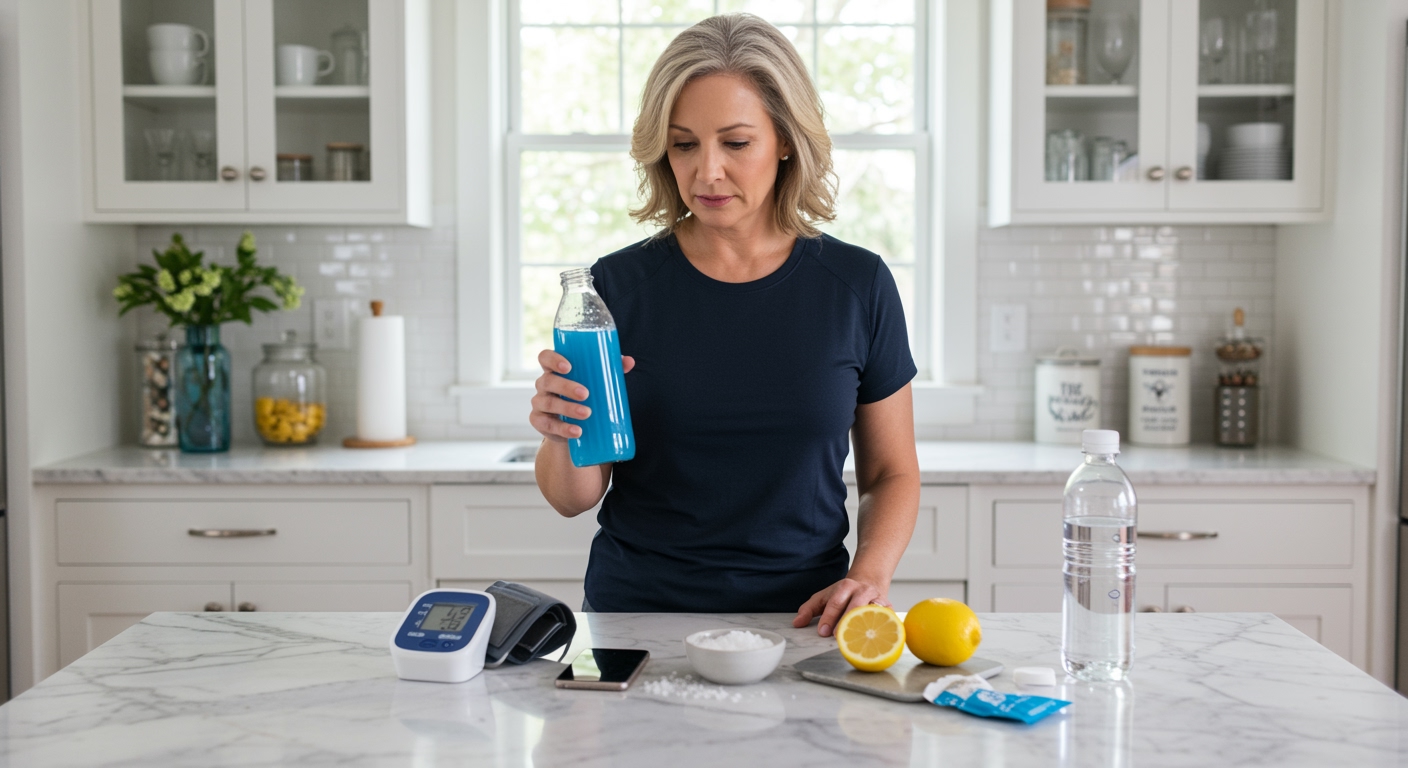✪ Key Takeaway: Sports drinks can temporarily raise low blood pressure through sodium and fluid volume but are not a medical treatment.
Introduction
Your blood pressure drops and you feel dizzy, weak, or lightheaded.
You might wonder if that colorful sports drink in your fridge could help boost your numbers back to normal range.
Hi, I’m Abdur, your nutrition coach and today I’m going to explain exactly how sports drinks affect low blood pressure and whether they should be part of your management strategy.
How Do Sports Drinks Affect Blood Pressure?
Sports drinks contain three main components that can influence your blood pressure: sodium, fluids, and carbohydrates.
The sodium content typically ranges from 100 to 200 milligrams per 12-ounce serving.
When you consume sodium, your kidneys retain more water to maintain proper sodium concentration in your blood.
This increased fluid retention raises your blood volume, which can temporarily increase blood pressure.
The additional fluids from the drink itself also contribute to this volume expansion effect.
However, this mechanism works both ways and the effect is usually temporary, lasting only a few hours.
✪ Fact: Your kidneys process excess sodium within 24 hours, returning blood volume to baseline levels.
What Makes Low Blood Pressure Dangerous?
Low blood pressure, or hypotension, occurs when your systolic pressure drops below 90 mmHg or diastolic below 60 mmHg.
The real danger comes from inadequate blood flow to vital organs like your brain, heart, and kidneys.
Common symptoms include dizziness, fainting, fatigue, nausea, and difficulty concentrating.
Dehydration is one of the most common causes of temporary low blood pressure.
When you lose fluids through sweating, illness, or insufficient intake, your blood volume decreases.
This reduction forces your heart to work harder to pump the remaining blood, but with less volume available, pressure naturally drops.
Other causes include certain medications, heart conditions, endocrine disorders, and prolonged bed rest.
✪ Note: Sudden drops in blood pressure require immediate medical attention to prevent organ damage.
Are Sports Drinks Better Than Water For Hypotension?
The answer depends on the underlying cause of your low blood pressure.
If dehydration is the culprit, sports drinks may provide a slight advantage over plain water due to their electrolyte content.
The sodium helps your body retain the fluids you consume more effectively.
However, if your hypotension stems from medication side effects, heart problems, or hormonal issues, sports drinks offer no meaningful benefit.
Water alone can be just as effective for volume replacement in most situations.
The key difference is speed of absorption and retention, not the final blood pressure outcome.
Sports drinks also contain 15-20 grams of sugar per serving, which can cause blood sugar spikes followed by crashes that may worsen hypotensive symptoms.
✪ Pro Tip: Add a pinch of sea salt to water for similar electrolyte benefits without the added sugars.
When Should You Avoid Sports Drinks For Low Blood Pressure?
Several situations make sports drinks inappropriate for managing hypotension.
People with diabetes should avoid them due to the high sugar content that can destabilize blood glucose levels.
If you have kidney disease, the added sodium burden may worsen your condition.
Those taking certain blood pressure medications should consult their doctor before adding extra sodium to their diet.
The artificial colors and preservatives in many sports drinks can trigger allergic reactions or digestive issues in sensitive individuals.
If your low blood pressure is chronic and medically diagnosed, you need proper medical treatment, not temporary fixes from sports drinks.
Regular consumption of high-sodium sports drinks when you do not need them can actually lead to high blood pressure over time.
✪ Fact: Excessive sodium intake increases cardiovascular disease risk even in people with normal blood pressure.
What Are Better Alternatives For Managing Low Blood Pressure?
Natural approaches often work better than commercial sports drinks for long-term hypotension management.
Increasing your daily water intake to 8-10 glasses helps maintain adequate blood volume.
Adding more salt to your meals provides sodium without the unnecessary sugars and additives.
Eating smaller, more frequent meals prevents postprandial hypotension, which occurs after large meals.
Wearing compression stockings helps blood return to your heart more efficiently.
Regular exercise strengthens your cardiovascular system and improves blood circulation.
If you prefer electrolyte drinks, make your own by mixing water with a pinch of sea salt and fresh lemon juice.
✪ Pro Tip: Stand up slowly from sitting or lying positions to prevent sudden blood pressure drops.
The Bottom Line
Sports drinks can provide temporary relief for low blood pressure caused by dehydration, but they are not a medical solution.
Real health comes from addressing root causes, not masking symptoms with quick fixes.
I would love to hear about your experiences with managing low blood pressure or any questions you might have about natural alternatives in the comments below.
References
At NutritionCrown, we use quality and credible sources to ensure our content is accurate and trustworthy. Below are the sources referenced in creating this article:
- PMC: Sports Drinks and Cardiovascular Health
- American Diabetes Association: Sports Drinks Impact on Glucose Blood Sugar
- Healthline: Electrolytes Drinks
- Gundersen Health: Water or Electrolyte Drinks Whats Better for Athletes





